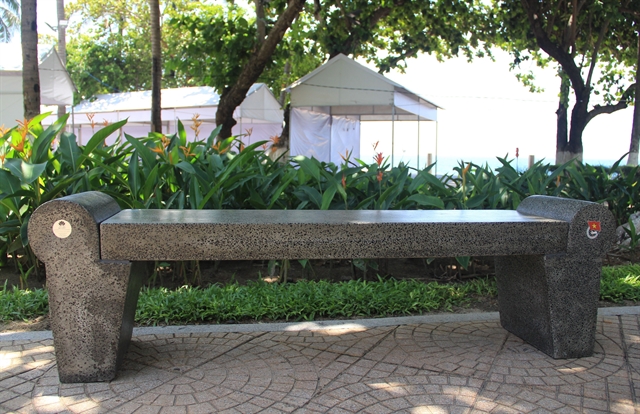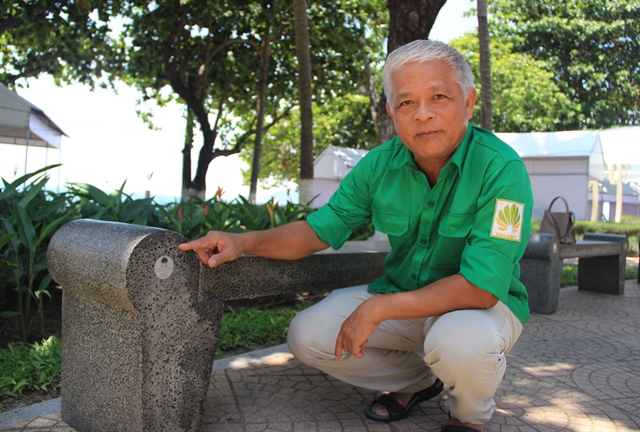 Society
Society


|
| A stone bench made from recycled plastic waste placed along Nha Trang beach. — VNA/VNS Photo Phan Sáu |
NHA TRANG — Nguyễn Văn Xuân, is an environmentalist in central Nha Trang City, is creating stone benches and paving stones made from recycled plastic waste.
Xuân, who is director of Resa energy company, mixed plastic and nylon scraps with cement and other additives to make a combination of construction materials.
The stone benches which weigh about 300 kg each are environmentally friendly and are estimated to last for more than 50 years.
They have been installed at Nha Trang beach park, as a way of encouraging locals and visitors to protect the environment.
Xuân said concrete is a widely used product while plastic waste is present everywhere. If we can solve the problem of plastic waste, we can find effective ways to protect the environment.
After studying several methods like pyrolysis and plasticisation, Xuân found the best way was plastic waste concrete method, or so-called "binding plastic into concrete".
This solution helps him calculate input and output prices reasonably and profitably.
The biggest advantage is that making concrete from plastic waste does not pollute the environment. Plastic waste will be cold processed, he said.
The plastic shredder can handle all types of garbage, and does not require sorting plastic waste like other hot recycling methods, he said.

|
| Nguyễn Văn Xuân with a stone bench made from recycled plastic waste. —VNA/VNS Photo |
He said: “With low investment costs, the products can compete with traditional products of the same type. Depending on the use function, plastic-concrete recycling products can meet the development needs of social life.
“Plastic waste concrete can be used for interior and exterior furniture, construction materials, low-load traffic roads and in-field canals.”
He believes the formula is very simple: Just combine plastic particles with concrete made from cement, sand, stone, aggregate and water. However, it is difficult for plastic to stick firmly to cement.
Xuân found a solution to add additives to bond concrete and plastic.
"The additives have been studied and mixed by my company's engineers,” added the 63-year-old.
Xuân collected plastic for recycling from his own family, neighbours and scrap collectors.
A stone bench weighing 150kg needs 50 kg of plastic. Its selling price is about VNĐ1.5 million.
Compared to fully concreted stone benches, the recycled benches are between 20 and 30 per cent cheaper. However, not many businesses show interest, he said, citing the main reason for the high cost spent on waste classification.
“We do not have a specific incentive policy for the use of recycled products, while consumers are hesitant about products made from waste,” he said.
In spite of challenges, his team finally could debut sample products and put them into practice.
He wished more individuals and organisations will join in plastic waste recycling.
He and his team are ready to share and transfer technology for free or collaborate to make investment and sell products.
“Despite many difficulties, we are determined to stay firmly on the path we have chosen," he said.
"We want to go far on this path to clean up the environment. Therefore, we urgently need the companionship of all people in sorting plastic waste.”
A lot of visitors show their excitement sitting on benches made from recycled waste at Nha Trang Beach.
Nguyễn Thị Hải, 45 years old, a tourist from Hà Nội, was surprised to know the materials that were used to make the benches.
“The bench is firm and safe, not much different from other concrete benches,” she said, adding that products like these will make major contributions to raising public awareness on environment protection.
Trần Anh Tuấn, secretary of Khánh Hòa Province’s youth union, said the union will work with Xuân to make more environmentally-friendly works such as building road sections paved with recycled plastic waste mixed with concrete or souvenirs made from plastic waste. — VNS